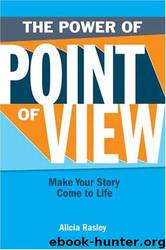The Power Of Point Of View by Alicia Rasley

Author:Alicia Rasley [Rasley, Alicia]
Language: eng
Format: epub
Published: 2011-03-29T07:00:00+00:00
CLASSICAL OMNISCIENT
1. Do you have any use for a narrative persona in this book? For example, in a comic novel, often an omniscient narrator can provide an ironic gloss to the situation and a jaundiced view of the characters.
2. If you want to go with an omniscient narrator in the classic sense, try this: Think of a film or TV star or news anchor that has just the right attitude for your narrator. Do you want your narrator to be wry and lofty like Alec Guinness? Or sharp and cutting like Joan Rivers? Or spooky and portentous like Vincent Price? Or sardonic and smart-alecky like Whoopie Goldberg? Or wise and reasonable like Walter Cronkite? Or generous and warm like Oprah Winfrey? What are the qualities you want in this narrator? Jot down two or three "markers" of this persona.
3. Now, keeping in mind that the omniscient narrator is often most effective in small doses, choose a passage, perhaps at the beginning or end of a scene, and slip in a bit of this narrator's voice and perspective. Imagine this persona surveying the scene or the characters and commenting on it. Do you want to sneak in a bit of foreshadowing ("little did they know ...") or is that too hokey for this story?
4. Classical-omniscient POV allows for, even encourages, creativity in providing a greater context, especially at the openings of scenes. Can you make use of this opportunity? (Most books will not, but if
you're interested, keep open the possibility.) For example, Jasper Fforde uses invented newspaper accounts, while Susanna Clarke, in Jonathan Strange & Mr. Norrell, uses footnotes referring to invented scholarly texts.
CONTEMPORARY OMNISCIENT_
Generally, what you see in modern fiction is not classical omniscient, complete with attitude and persona, but a more restricted form I call contemporary omniscient. Contemporary omniscient is a more flexible version of omniscient that eliminates the narrative persona, though not the narrative control. How can you recognize contemporary omniscient? Consider who is in the scene. Is there knowledge, experience, description, or action that no single character in the scene can convey? If so, then you're in omniscient. Do you also have a narrative persona—not just floating knowledge, but a consistent human attitude (irony, disgust, gentle amusement) toward the events and characters? If so, you're in classical omniscient, not contemporary.
If you think of classical-omniscient narration like a film with an elegant voice-over by, say, Morgan Freeman, contemporary omniscient is more like those old movies where, in the introduction and during breaks in the action, a bit of text scrolls across the screen. (The Star Wars franchise does this at the beginning of each episode: "A long time ago, in a galaxy far, far away ...")
What contemporary omniscient lacks is Morgan Freeman—the narrative persona, that ironic, all-wise, witty voice commenting on events. What contemporary omniscient does have, however, is the comprehensive knowledge of everything in the story, including perhaps the background of the setting, the characters, and the history of the story. Yet, the whole of the knowledge presented in the narrative is greater than the sum of that possessed by all the characters.
Download
This site does not store any files on its server. We only index and link to content provided by other sites. Please contact the content providers to delete copyright contents if any and email us, we'll remove relevant links or contents immediately.
Asking the Right Questions: A Guide to Critical Thinking by M. Neil Browne & Stuart M. Keeley(5759)
Autoboyography by Christina Lauren(5227)
Eat That Frog! by Brian Tracy(4526)
Dialogue by Robert McKee(4389)
Sticky Fingers by Joe Hagan(4188)
Journeys Out of the Body by Robert Monroe(3615)
Annapurna by Maurice Herzog(3464)
Full Circle by Michael Palin(3443)
Schaum's Quick Guide to Writing Great Short Stories by Margaret Lucke(3374)
Elements of Style 2017 by Richard De A'Morelli(3341)
The Art of Dramatic Writing: Its Basis in the Creative Interpretation of Human Motives by Egri Lajos(3058)
Atlas Obscura by Joshua Foer(2952)
Why I Write by George Orwell(2945)
The Fight by Norman Mailer(2929)
The Diviners by Libba Bray(2927)
In Patagonia by Bruce Chatwin(2920)
The Mental Game of Writing: How to Overcome Obstacles, Stay Creative and Productive, and Free Your Mind for Success by James Scott Bell(2897)
Venice by Jan Morris(2568)
The Elements of Style by William Strunk and E. B. White(2470)
